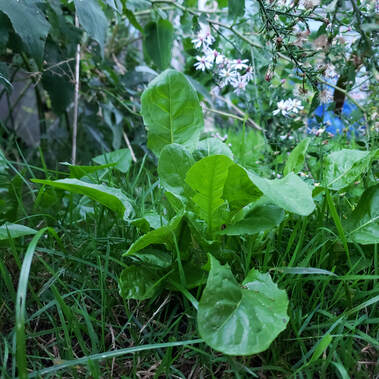 Time for Spring Cleaning Here we are in the home stretch of winter in the northeast, with spring just around the corner. It’s almost time for the age-old tradition of spring cleaning, when we clear out the build up in our homes and gardens that accumulated over winter. We can also think about spring cleaning for our bodies during this time. In the colder months we tend to consume heavier foods and move our bodies less, which can take a toll on our digestive, liver, lymphatic, and kidney function and leave our body feeling sluggish. By supporting these detoxification organs we can help our body clear out built up toxins and metabolic waste. In doing so, we support the body in its many other functions, because a healthy detoxification system is critical for good health. While spring is a traditional time to think about detoxification, and many of the first herbs popping up in the spring here in the northeast happen to support the body’s detoxification channels, we need not limit our support of detoxification organs to this time of year. In fact, it can be really helpful to include detoxification support any time we are addressing a challenge or stuck pattern. Easy Does It Before we get too far, let’s be clear about what type of cleansing and detoxification we are promoting here. Too often we see intense cleansing protocols promoted in the name of detoxification, and often these are focused on flushing out the gastrointestinal tract. These protocols can be harsh on the body, and even dangerous at times. In contrast, as herbalists we understand the body to be a self-healing organism with appropriate mechanisms to maintain good health, but that sometimes it just needs a little extra support. We use herbs to gently support the body’s innate detoxification channels - sort of like a little nudge to wake things up and get moving. Filter and Flow Our bodies have a system of detoxification channels that all work together to reduce toxins and metabolic waste from building up in the blood and body. The key players in our detoxification system are the liver, kidneys, lymphatic system, bowels, and skin. When we think about detoxification, it’s all about filtering out the waste and keeping things flowing so it doesn’t build up. I’ll briefly describe some of the basic functions of the different detoxification channels so we then look at how herbs can support them. The liver filters toxins and metabolic waste from the blood and converts it into bile, most of which is later excreted through the bowels, along with other waste products. The kidneys filter toxins to be excreted via urine. The lymphatic system cleans the interstitial fluid and dumps the waste into the bloodstream for eventual removal by the liver and kidneys. The skin, an often overlooked detox organ, can also excrete waste from the body, though it is the least effective and often picks up the slack if other detox organs are sluggish. Herbal Allies for Detoxification We can use gentle herbs to support the structure and functions of the body’s detoxification channels so that they stay open and moving. These types of herbs are traditionally referred to as alternatives, or “blood cleansers.” Alterative herbs can work through different mechanisms, but in one way or another, they all work to help the body’s ability to keep waste and toxins from building up in the body. Below are some different types of alterative herbs that support the body’s innate detoxification channels. Because the system of detoxification and elimination channels all work together, it’s important to support them simultaneously, rather than just focus on one.
It’s likely not a coincidence that some of the first herbs that appear in the springtime support the body’s detoxification channels. Specifically, we think about nettles, violets, dandelion leaf and root, and burdock root as being spring herbs here in the northeast. A Rejuvenating Spring Tea Below is a loose template for making a rejuvenating tea using locally grown/wildcrafted herbs that support the body’s detoxification system. Feel free to adapt it with your favorite yummy nervines or what is growing around you (e.g. perhaps you add in or substitute violets for the red clover). 1 TBSP Nettle leaf 1 TBSP Red clover 1 TBSP Delicious nervine of your choice (tulsi, linden, anise hyssop, etc.) 2 tsp Dandelion root 2 tsp Burdock root Steep, covered, overnight in 1 quart of boiling water. Strain in the morning and sip throughout the day. Beyond Herbs In addition to using herbs to support some gentle spring cleaning of your body, here are some strategies that can further support your body’s innate detoxification pathways:
As always, herbs are most effective and helpful when paired with the foundational pillars of health: sleep, stress management, nutrition, hydration, and movement. Though herbs can be really helpful in supporting the body’s structure and functions, they are not a replacement for these core practices. If you are feeling unsure if you could benefit from some gentle spring cleansing or want to get advice tailored to your unique situation, we encourage you to reach out to one of our Clinical Herbalists. By Jennifer Porter, clinical herbalist at Railyard. Jennie believes in the medicinal power of plants to help restore balance to our bodies and minds. As a clinical herbalist, she helps clients use food, plants and lifestyle shifts to move toward their health goals. In her experience, healing begins in a safe, non-judgmental space, and she welcomes clients of all ages and identities to explore how plants can support their wellbeing. Whatever your needs may be – preventative, acute, or chronic - she will create individualized recommendations and formulas that reflect your unique experience, goals, and lifestyle.
0 Comments
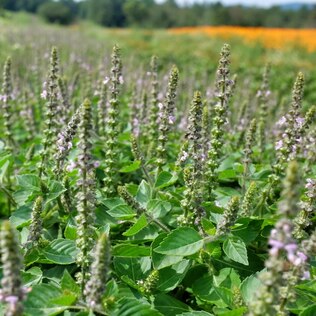 Tulsi at Foster Farm Botanicals, VT Tulsi at Foster Farm Botanicals, VT A nervine is a term used to describe a broad category of plant actions that have an effect on the nervous system. Nervines help to restore, balance, and bring ease to our nervous system. Depending on the individual, nervines may be used to calm and focus, uplift and move, relax and unwind, or bring ease to the mind and heart. Subcategories of nervines There are three major subcategories of nervines: nervine tonics, relaxing nervines, and stimulating nervines. As with any category of herbal actions (i.e. adaptogen, bitter, nootropic, immune stimulant, etc.) plants can be further characterized by defining their qualities such as aromatic, warming, and moistening. Although beyond the scope of this article, a sense of these characteristics is helpful to identify which herbs will be most helpful for a particular person and situation.  Linden tree Linden tree The nervous system reaches–or innervates (literally, “to supply with nerves”)-all parts of our body. When we support the nervous system with nervines we, in turn, also support other functions in the body, such as digestion, immunity, cardiovascular health, and adrenal health. This is why nervine herbs are used in far more formulas than ones primarily designed to support the mind and heart. This is a perfect example of how in herbalism, a person is viewed holistically. It is never “just the mind and heart.” The mind and emotional heart imbue and influence every part of the body. Now, let’s dive into the three major categories of nervine herbs… Nervine tonic A nervine tonic is an herb that broadly supports nervous system function and integrity. These tonic herbs strengthen and nourish the nervous system, and are helpful when a person’s nervous system has been heavily taxed. Often taken daily for extended periods, nervine tonics help to restore and replenish a healthy nervous system. Some favorite nervine tonics are skullcap, milky oats, and St. John’s wort. Nervine relaxant A nervine relaxant is an herb that helps to bring a sense of calm into a person’s perception. These herbs can be supportive any time of day, whether to soothe nerves that may upset the digestive tract, calm a scattered mind mid-day, or to ease into rest and recuperation at the end of the day. These herbs can be used in the moment to support occasional stress or anxiety. There are so many wonderful nervine relaxants to choose from, so it can be helpful to consider the energetics of the herbs when selecting which might be right for a person or situation. Some examples include:
Nervine Stimulant A nervine stimulant is an herb that brings excitement and stimulation to the nervous system. This can be especially helpful for occasional sluggishness or a tendency towards lower-than-desired-function in body or mind. Some of the best known and most widely consumed herbs in the world are nervine stimulants, such as Camellia sinensis (tea plant), Coffea species (coffee), and Theobroma cacao (chocolate). While these all contain caffeine and are quite strong stimulants, there are other herbal nervine stimulants that can promote gentle alertness, such as rhodiola, tulsi, and rosemary. Putting it together The information above is a basic guide to understand the nervine action and its nuances, but it is important not to get hung up on the categorization of the herbs. Each herb is complex- just like humans! Herbs carry a range of effects and have affinities for various body systems. Blending a nervine relaxant with a nervine stimulant or a nervine tonic often creates a balancing blend that takes into account the broadness of human experience by supporting various areas of body, emotion, and mind. To illustrate this point, let’s consider a person with significant muscular tension due to occasional stress who may feel tired or have difficulty focusing because of the energy it takes for them to continue holding tension in their body. In this case, they may benefit from a relaxing nervine that can help liberate stuck energy and improve outlook. A relaxing nervine might have the desired invigorating effect for this person, rather than a stimulating plant which could cause even more tension. Related categories Beyond these basic categories of nervine herbs, there are more specific categories of nervine herbs, such as:
Get support If you want help choosing which nervines may be most appropriate for you, reach out to one of our clinically-trained herbalists to get individualized recommendations. Originally written by Susan Staley 10/13/2020. Updated by Jennifer Porter 3/19/2024. Are you looking for more energy? Perhaps you're experiencing one of the following scenarios: struggling to stay focused and reach your goals; getting sick frequently; feeling burnt out. A foundational concept that relates to all of these and more is the idea of vitality. Herbalism - an ancient approach to vitality Herbalism as both a philosophy and a system of medicine offers a multitude of ways to support vitality by supporting its foundations. I've seen for myself and clients I work with the profound differences that even small changes can make. I can't begin to count the number of times I've had a productivity slump turn around with the simple addition of skullcap or tulsi, or the ways that supporting my emotional health has opened up energy in unexpected areas of life. The journey to your best self Herbal medicine can help support you in becoming your best self. Specifically, supporting overall vitality can affect:
We'll also talk about how herbs themselves can help support men in each of the core areas. Note that in this article I'm focusing on the specific health needs of men because it's a unique group with unique tendencies, however this information may be applicable to people who identify as other genders, especially those raised as men. Let's dive in and take at look at some of the natural remedies for men's health. Vitality - the traditional understanding Historically, in the medicine lineage going back to Hippocrates in Ancient Greece (which actually went further back to Egypt and more), there was a concept called "physis." This basically referred to the body's ability to regulate itself, somewhat similar to the modern concept of "homeostasis" but with a much deeper meaning. The idea is that if we supply the body with what it needs then the body will maintain and heal itself. This concept is broader than the idea of vitality, but it is similar. The way we experience vitality in our bodies is intuitive - we all know moments where we feel full of energy, full of vitality and full of potential. We feel alive, vibrant and able to accomplish our dreams. And we also know the opposite. Vitality, physis and health generally can be affected by many things, and in the traditional Greco-Arab herbalism lineage there were six primary factors:
Get guidance on herbs and your wellness
Sign up for a free info call Climate and weather
Fresh air and sunshine The first consideration is just getting outside - fresh air and sunshine are fundament for good health and vitality. In Vermont, this can be difficult in the winter due to the cold, but it's also in some ways it's even more important because of the limited sun. What are some small ways you can try bundle up and get outside every day? Maybe it means upgrading your winter gear. Maybe it's going for a short walk around the block. Maybe it's building in time to walk or take the bus to work if possible. In any case, trying spend 15-45 min. or more outside every day or most days of the week can go a long way. Staying protected from the elements The second consideration is protecting ourselves from the elements when we are outside. Men in particular due to the way we've been socialized sometimes have the idea that we should "tough it out," i.e. go outside in the cold with a t-shirt. There might be good reasons behind this, i.e. slowly and intentionally building up cold tolerance, but in many cases inadequate weather protection can do more harm than good, make us more vulnerable to colds and respiratory illnesses, for example. So the first thing to consider is gearing up appropriately for the seasons and still venturing outdoor to enjoy the benefits of fresh air. In VT in the winter, this means investing in adequate jackets, hats, etc. as well as things like thermal underwear to make being outside less of a shock to the system. Herbal support In terms of herbs there are some simple ideas:
Digestion Herbalists often say that it's not what we eat that matters, but what we assimilate. Good digestion has traditionally been seen as a foundation of good health and vitality - and for good reason. Mindful eating Digestion can be an overlooked area. A lot of us men end up consuming all sorts of things without noticing how it lands in our body, i.e. in our digestive system. This can include even "healthy" things that are jumbled or blended together in a way that our body can't digest well, i.e. cold protein shakes with massive amounts of powders or supplements added in. So the first and most important thing for men is to be mindful in the process of eating. Take a moment to breathe, relax and even smell your food before diving in. Take small bites, chew thoroughly and savor the flavors. So much labor and energy went into our food - let's appreciate that. By simply being more mindful, our body's cues for digestion are triggered. The digestive juices start flowing and the digestive process starts kicking in. Our parasympthetic state ("rest and digest") kicks in. With the improved chewing, our digestion also has to work less hard to break down the food. The net effect is that often times things can become better assimilated and potential digestive symptoms avoided. More tips
Bitters blends: The simplest way to start supporting digestion with herbs is with digestive bitters. Bitters work by stimulating our digestive juices similar to the way that mindful eating does. By taking bitters 10-15 minutes before meals our digestion can get a kickstart and oftentimes improved assimilation is the result. Look for bitters blends like those by Urban Moonshine, or try herbs like dandelion, burdock or orange peel. Even commonly available bitter salad greens like arugula can have a similar function. Food and beverage Now that we've talked about digestion, let's talk about food. Food needs of course are going to vary widely depending upon the person. However, in simple terms, we can say that for most men, eating whole, natural foods and avoiding excessive processed foods is an important place to start. Whole food, plant based diets Men tend to struggle more with cardiovascular health as we age, which can seriously affect vitality, and for some men that might have to do with an excessive amount of animal protein, especially so if it's processed. Good alternatives are switching to grass-fed animal products or fish, and limiting meat to once a day, several times a week, or eliminating it entirely, favoring plant-based proteins instead like whole legumes, nuts and seeds instead. There is also an urge that men might have to make up for lack of things like fresh fruits and vegetables in the diet by instead trying to substitute with vitamin and mineral supplements. While this can be very helpful for hard to get nutrients like Vitamin D and magnesium, in most cases it's healthier to get our nutrition from food sources, especially plants. Controlling impulses Another struggle for men is impulsive unhealthy choices around food or alcohol. A suggested way to address this is finding adequate substitutes. Herbal support Herbs can help in the food and beverage category by providing healthy alternatives:
Movement and rest Finding a balance This is another tricky one for guys. On the one hand, we have an overall very sedentary culture and a lot of men don't move as much as should be, instead being unaware of our bodies and engrossed in the stimulation provided by screens. On the other hand, men can be prone to overwork and even over-exercise, not taking adequate time to give their bodies a chance to rest and rejuvenate. The balance lies somewhere in between - giving ourselves plenty of rest and downtime, and at the same aiming to do even just 15 minutes/day of movement, ideally outdoors. Herbal support Nervine relaxants: Herbs can help to promote rest and relaxation time in the category of herbs called "nervine relaxants." This category includes common calming herbs like lavender or chamomile, as well as herbs like lemon balm, linden and passionflower. Having a cup of one of these herbal teas in the afternoon or evening to unwind can go a long way. Anti-inflammatories: When it comes to movement, herbs can help a lot with the normal after-effects of vigorous exercise such as relieving pains or discomforts. Herbs like turmeric and ginger can help long-term (not as good for men that get easily overheated because they are warming spices), and immediately following intense activity salicylate containing herbs like meadowsweet or willow bark can help. Sleep This is another big one in our culture. Probably a majority of men do not get enough sleep, meaning a minimum of 7 hours but for some men up to 9-10 hours. There are so many reasons, such as demands related to work or household responsibilities, or health conditions that make sleeping difficult. Sleep hygiene The most important thing with sleep is to address sleep hygiene, specifically:
Herbal support Relaxing herbs: When needed, herbs can help support sleep, especially with falling asleep. Common herbs like those mentioned for relaxation can apply here, with larger-than-daytime doses 30-60 min. before bed (i.e. chamomile, lavender, lemon balm), or more potent sleep herbs like hops or valerian. Herbs can really help significantly, but remember they won't substitute for the above. Emotions In today's day and age there's not enough credit given to the effect that emotions have on health and vitality, though this connection was very obvious in traditional medicine, so much so that in a medical sense emotions were often described in terms of the physical symptoms they were often correlated with. Processing emotions It goes almost without saying that for men finding healthy ways to process or deal with emotions can be difficult. Many men are socialized to suppress emotions so that they can continue working harder and appear somehow strong or infallible. This cultural phenomenon has, in my opinion, caused a lot of harm. The first step here is simply acknowledging the emotions that we experience, and that they can be uncomfortable. The second step is finding a healthy way to express these emotions, which likely should ultimately involve sharing those emotions and getting support from other people, whether it's friends, family, support groups or a counselor or therapist. Herbal support Uplifting and relaxing herbs: Herbs can't be a substitute for doing the work in this area but they can play a supportive role. Again, the relaxing herbs show up, particularly those that also can affect the mood like lemon balm, linden or tulsi. Herbs like these can provide a gentle boost toward positivity, helping our mental chatter to subtly move in a more positive direction without shutting down the underlying emotions. Conclusion A lot of us are looking for more energy. For men, there are things related to how men are socialized that affect how we maintain our energy. Herbal medicines provides a framework based on ancient principles for supporting day-to-day vitality with healthy diet and lifestyle choices. Herbs themselves can provide support in each area. If you're looking to get started with herbs, start with something small and that you know is safe for you. If there's anything we can help with, feel free to get in touch! Written by Nick Cavanaugh. Nick is a clinical herbalist practicing at Railyard Apothecary. To book a consultation to get support with your health click here. 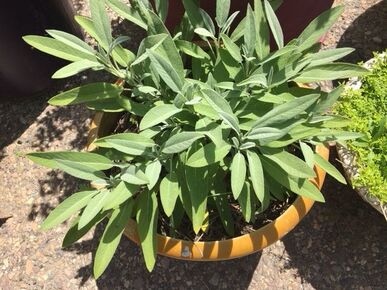 Are you having trouble sticking to your New Year’s resolutions? Or just having trouble staying focused on your work or goals? A group of herbs, called nootropics, may be able to help. What are nootropics? Nootropics (pronounced no-o-trow-pic) are substances–natural or synthetic–which improve cognitive functions, such as learning, attention, and memory. You may have seen them referred to as “smart drugs” in popular media. These substances can support healthy brain function through multiple mechanisms, including:
Certain pharmaceuticals can be nootropic, which may in some cases be deemed appropriate by your doctor. Some herbs, however, are also nootropic, and these are often safe and appropriate for most people. You have likely already used a well known plant-derived nootropic–caffeine! There is a long history of intentionally using herbs to enhance cognition across various cultures. The ancient Indian medical system of Ayurveda has been using herbs known as Medhya Rasayanas, such as gotu kola (Centella asiatica) and bacopa (Bacopa monnieri), to support memory and intellect since 6,000BC [1]. Lion’s mane and reishi mushrooms have been used in traditional Chinese medicine (TCM) to help maintain cognitive function and address mild memory problems associated with aging for almost 5,000 years [1]. We also see herbs used in this way in ancient Arabian, Egyptian, and Sumerian medical texts, to name just a few more [1]. How are nootropics used? While you may see a lot of hype about nootropic substances among people focused on endlessly increasing productivity, we caution you to reserve nootropic herbs for only those times that you really need them. They are best used situationally when you are most in need of mental focus, such as before a big exam, presentation, or deadline. They can also be used when experiencing occasional “brain fog” that impacts our ability to perform at our best. When using nootropic herbs to increase cognition or productivity above your healthy baseline, we do not advise prolonged uninterrupted use. Our brains, like our bodies (or rather, as part of our bodies), need periods of rest. We are not meant to be continuously maximizing our cognition and productivity, despite what capitalism might have us believe. Nootropic herbs are most effective when used cyclically, allowing for rest between “pushes” of productivity or cognition. Which herbs are nootropic?
Beyond nootropics Nootropics are not the only herbs that can support your cognition and productivity. Let us not forget the foundational pillars of health–nutrition, exercise, relaxation, sleep–which set the stage for optimum mental performance. While it may be tempting to use nootropics to make up for a deficit in these areas, they can only get you so far. We all know that our brains can be tired or foggy after the occasional poor night’s sleep. Relaxing nervine and gentle sedative herbs, such as valerian, chamomile, passionflower, and skullcap, can help ensure a good night’s rest and fresh mind the next day. Being in a constant state of heightened stress can also impair attention and cognition. Nervines and adaptogens can modulate your body’s stress response so you can be more clear headed and focused. Using nervine and adaptogen herbs to support healthy sleep and relaxation will allow nootropic herbs to more effectively enhance your cognition when you need it most. By Jennifer Porter, clinical herbalist at Railyard. Jennie believes in the medicinal power of plants to help restore balance to our bodies and minds. As a clinical herbalist, she helps clients use food, plants and lifestyle shifts to move toward their health goals. In her experience, healing begins in a safe, non-judgmental space, and she welcomes clients of all ages and identities to explore how plants can support their wellbeing. Whatever your needs may be – preventative, acute, or chronic - she will create individualized recommendations and formulas that reflect your unique experience, goals, and lifestyle. References
[1] Cristina Lorca, María Mulet, Catalina Arévalo-Caro, M. Ángeles Sanchez, Ainhoa Perez, María Perrino, Anna Bach-Faig, Alicia Aguilar-Martínez, Elisabet Vilella, Xavier Gallart-Palau & Aida Serra (2023) Plant-derived nootropics and human cognition: A systematic review, Critical Reviews in Food Science and Nutrition, 63:22, 5521-5545, DOI: 10.1080/10408398.2021.2021137 [2] Malík, Matěj, and Pavel Tlustoš. 2023. "Nootropic Herbs, Shrubs, and Trees as Potential Cognitive Enhancers" Plants 12, no. 6: 1364. https://doi.org/10.3390/plants12061364 [3] Docherty, Sarah, Faye L. Doughty, and Ellen F. Smith. 2023. "The Acute and Chronic Effects of Lion’s Mane Mushroom Supplementation on Cognitive Function, Stress and Mood in Young Adults: A Double-Blind, Parallel Groups, Pilot Study" Nutrients 15, no. 22: 4842. https://doi.org/10.3390/nu15224842 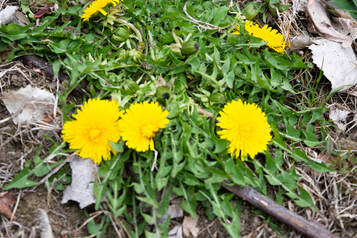 The holiday season brings a host of delicious treats and decadent meals. These foods are often nostalgic and culturally important, tasting of old family recipes or seasonal flavors. They can also tax our body’s digestive and detoxification systems leaving us feeling sluggish, bloated, gassy, or just less than ideal. Benefits of bitters Amidst all the sweet and rich foods, we invite you to incorporate the bitter flavor into your holiday season this year. Stimulating the bitter taste receptors is like running through the halls ringing a bell, alerting your digestive system to wake up and prepare to digest what you’re about to eat. It stimulates the flow of digestive enzymes and secretions that support healthy digestion. Having all of your digestive secretions operating optimally is especially important when we eat rich, heavy foods that are harder to digest. The amazing powers of the bitter flavor don’t stop there. In addition to promoting optimal digestion, bitter foods and herbs also promote healthy liver function, which is necessary for optimal detoxification and metabolism. Moreover, the bitter flavor can support a healthy appetite and help cue our bodies to feel satisfied before we overeat. Taken together, the many benefits of the bitter flavor make it a superstar during the holiday season. Bitter in the diet The bitter flavor has largely been eliminated from the standard American diet, but it has a long history of use to support optimal digestion and elimination. Our diets used to include a much greater variety of wild plants, many of which tasted bitter. Some still remain, such as dandelion greens, radicchio, and arugula (think of starting a meal with a bitter green salad). We see cultures around the world incorporating the bitter flavor into culinary traditions, such as Italian aperitifs and bitter chutneys in south Asia. Herbal digestive bitters In addition to incorporating bitter foods into your diet, you can take herbal digestive bitters before your meals to promote healthy digestion and metabolism. Herbal digestive bitters are an alcohol based extract of bitter tasting herbs. A couple squirts of herbal bitters taken straight into the mouth or added to a little water (use soda water for a bitter spritz!) 10-20 minutes before meals work quickly to get your digestive juices flowing. They can also be used to alleviate occasional indigestion, heartburn, gas, and bloating. Herbal bitters are especially handy during the holidays when you aren’t sure if bitter elements will be included in your celebrations. Carry a small bottle with you and you’ll be ready to handle all the indulgences the holiday season brings. Bitters + Aromatics Most herbal bitter formulas blend aromatic herbs with bitter herbs. Generally relaxing to the digestive tract tissue, aromatic herbs keep food moving along smoothly, while the bitter herbs support healthy digestive secretions and function. The aromatic herbs also tend to be more warming, which balances the colder nature of bitter herbs. The general rule of thumb is to use roughly equal parts of bitter and aromatic herbs. Below are some commonly used herbs in each category. You’ll notice that some herbs are both bitter and aromatic. You can mix and match aromatics to create various flavor profiles. For example, combine ginger, cinnamon, cardamom for a chai profile, or lavender and chamomile for a floral profile. Bitter herbs: dandelion root, burdock root, gentian root, artichoke leaf, yellow dock root, citrus peel, ginger Aromatic herbs: ginger, angelica, citrus peel, cardamom, cinnamon, fenugreek, fennel, star anise, lavender, chamomile Below is a recipe to make your own digestive bitters using a blend of bitter and aromatic herbs. Feel free to swap out other bitter and aromatic herbs to make the recipe your own! BASIC DIY HERBAL BITTERS Ingredients 1 Tbsp dried dandelion root 1 Tbsp dried artichoke leaf ½ Tbsp dried gentian root 1 Tbsp chopped orange peel 1 Tbsp cardamom pods 80 proof vodka Directions Combine herbs into a pint sized jar (they should only fill half the jar or less). Add enough vodka to the jar to fully cover the herbs plus a little extra (the dried herbs will absorb some of the liquid). Cover the jar and shake vigorously. Let it sit for 2-4 weeks, shaking gently once a day. If the liquid level falls below the top of the herbs after a couple of days, just add a little extra. Strain the liquid and decant into small dropper top bottles for easy dispensing. Take a couple dropperfuls before/after meals as needed. Thanks for reading! By Jennifer Porter. Jennifer is a clinical herbalist here at Railyard Apothecary. In her experience, healing begins in a safe, non-judgmental space, and she welcomes clients of all ages and identities to explore how plants can support their wellbeing. Whatever your needs may be – preventative, acute, or chronic - she will create individualized recommendations and formulas that reflect your unique experience, goals, and lifestyle. Book a consultation with Jennifer here. 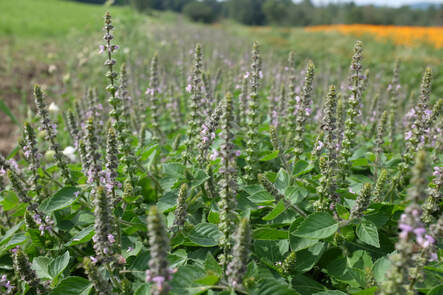 We may be deep in the heart of cold and flu season already, but it’s never too late to use herbs to bolster your immune system. We do have a few more months of winter here in Vermont, after all. Here, we’ll walk you through two types of herbs you can incorporate into your daily routine that can keep your immune system humming along this season. For more information on holistic ways to naturally strengthen and support immunity check out this previous post. And for some inspiration to incorporate immune supportive herbs into your routine, remember the old adage, an ounce of prevention is worth a pound of cure! Immune Tonics: this class of herbs stimulate deeper activation of the innate immune system and help bolster immune defenses. They usually work better over the long term, and have cumulative effects. These herbs are best used preventatively rather than during acute infection. Elderberries: one of the most delicious immune tonics we have, elderberries make a great syrup that is easy and enjoyable to work into your daily routine - even most kiddos like it! The syrup can be taken alone but is a great addition to beverages or food. Try mixing it with soda water or a cup of tea or pouring it over yogurt, oatmeal, or waffles. Astragalus: an ancient medicine used by Chinese medicine practitioners for thousands of years, this root is a great daily tonic for folks who are particularly susceptible to catching whatever virus is going around. With a sweet, mild flavor, astragalus can be taken as a powder, tincture, or in decoction. The root slices are also easy to toss into soups, stocks, and grains while they simmer (just remove before eating). Many herbalists advise folks to not take astragalus while they have an active infection. Medicinal Mushrooms: a variety of mushrooms act similarly to astragalus as immune tonics. Some key ones to consider are maitake, shitake, reishi, and turkey tail. They can be taken as tincture, powder, or in decoction. Because of their earthy flavor, dried mushrooms also make a great addition to savory soups and stocks. Medicinal mushrooms have a modulating effect on the immune system, so while they help bolster deficient immune defenses, they can also help balance out hypersensitive immune responses, such as autoimmune or allergic conditions. When looking for medicinal mushroom products, make sure that tinctures are double-extracted and powders are steam activated to ensure you get the most beneficial compounds. Adaptogens: this class of herbs supports a strong immune system by helping the body be resilient to the stressors of daily life. We know that stress hinders immune function, so by modulating the stress response we allow our natural immune defenses to do their job. Like immune tonics, adaptogens work cumulatively over time and should be taken regularly. There are a variety of adaptogens that suit different types of people, but here we describe a few that are pretty widely applicable and have extra benefits for the immune system. Eleuthero: sometimes referred to as Siberian Ginseng, this root builds vitality and is mildly stimulating. It can be helpful for folks who need a little extra energy or endurance. It can be taken as a tincture, powder, or in decoction. Tulsi: also known as holy basil, this aromatic herb is a widely applicable adaptogen that can be simultaneously uplifting and calming to the mood. It can be taken as a tincture or powder, but we suggest trying it as a tea to experience its unique and delicious flavor. Ashwagandha: this nutritive, building root is often thought of as a more calming adaptogen and is especially indicated for folks who are depleted but unable to switch out of the sympathetic nervous system - a combination sometimes referred to as “tired and wired.” It can build resources and resiliency while helping to quiet nervous system activation. It can be taken as a tincture, powder, or in decoction. We hope these suggestions are a helpful starting point for you to take some proactive steps to strengthen your immune system and prevent future infections. If you’d like help matching yourself with the most appropriate herbs, talk to one of our herbalists! Get immune support from an herbalist
🌿 Schedule a "quick advice" herbal consultation for a 20-minute chat We'll come up with a custom herbal sleep formula for your individual needs. 🌿 Looking for deeper support? Schedule our 3-month herbal support package. We'll help you to find the root cause of sleep difficulties with a comprehensive review of your overall health and a personalized herbal, diet and lifestyle plan. 1/27/2023 7 Pillars of Healthy Sleep: How Diet, Lifestyle and Herbs Can Improve Your Sleep PatternsRead Now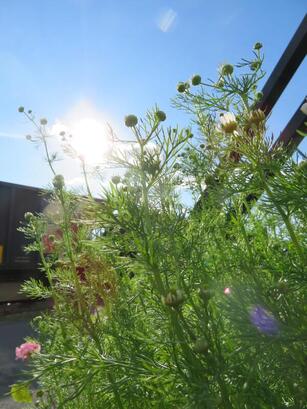 Chamomile in the rail yard. Chamomile in the rail yard. In modern time, many people have difficulty with sleep. In this guide we'll walk you through some of the most important factors for promoting healthy sleep, including herbs that can play a supportive role. Please keep in mind that though what we'll discuss here are foundational things for healthy sleep, for some people they may not be enough. Please consider seeking medical help if needed. And if you are looking for support in working with herbs, we'd suggest talking to an herbalist. 1. Have a consistent sleep and wake schedule Experts agree that in terms of healthy sleep there are many benefits from keeping a consistent sleep time and wake time, even on the weekends. This can help to regulate our circadian rhythms and natural hormonal shifts that take place relative to sleep and wakefulness. In the modern day this is not easy! It's common to stay up late and sleep in on the days off from work. For those looking to improve their sleep though, it may benefit to start moving toward a more consistent direction, even if it's a small change (for example 30 minutes closer to the same time). 2. Have healthy daytime habits Exposure to daylight and daytime exercise are two things that can have an impact on sleep. Exercising consistently in the morning hours can help stimulate seratonin. Seratonin contributes to feelings of wakefulness and alertness, and it is better for sleep if it's stimulated earlier in the day. If it's not possible to exercise in the morning, then consider getting at least a chance to spend time outside in the daytime hours. Additionally, a lot of people are not able to sleep restfully due to the effects of stress. How are you managing your stress during the day? Are there additional tools you could be utilizing? People you could call on for support? If sleep is an issue, consider looking further into ways to support yourself during the daytime hours so that you feel more relaxed and ready to sleep at night. 3. Consider the effects of food on sleep Consider eating a breakfast and lunch at consistent times during the day. Including protein in your breakfast meal will help to increase feelings of wakefulness because protein can promote the synthesis of dopamine. Also, protein takes longer to break down than carbs and can provider longer lasting energy. At nighttime, it's best to avoid eating 2-3 hours before bedtime. If you do feel the need to eat closer to bed, choose higher-carbohydrate foods which can digest more quickly and easily, and which naturally may promote feelings of sleepiness. 4. Be aware of stimuli The obvious stimuli are substances like caffeine and tobacco (but alcohol too can interfere with good quality sleep even though it may initially promote drowsiness). Consider limiting or avoiding these substances, especially in the evening, if you are having difficulty with sleep. Light is another major stimulus when it comes to feelings of wakefulness. The big one is screens, which due to their blue light may interfere with melatonin (a sleep promoting hormone). Ideally, limit exposure to screens for at least 1 hour before bed. If you like to read on a screen, consider reading printed material in low light instead. Additionally, consider reducing other indoor, artificial light sources as the sun goes down in order to promote natural circadian rhythms. 5. Utilize relaxation techniques In addition to the many tools and support mechanisms for managing stress during the daytime hours, there are some specific techniques for promoting relaxation and rest at night: - Take a hot bath or shower 1-hour before bed - Do meditation or yoga to unwind - Journal with pen and paper to process emotions - Write down lists of things you need to do, and maybe even put them on a calendar - Chat with a loved one or friend - Drink a cup of herbal tea If you're not sure where to start, consider picking just one thing and giving it a try for some time. 6. Optimize your sleep environment If you have the means available, consider optimizing your sleep environment starting with your bed itself. How comfortable is the mattress itself? Could it be more comfortable by replacing it or adding a mattress pad? Also consider the bedding and sleep clothing you're utilizing to optimize comfort. Also consider eliminating light sources in your bedroom by using heavy or blackout curtains, and by reducing or eliminating electronic sources of light. Why do you need to see the digital clock? If you are setting an alarm anyway, it probably doesn't actually help to know what time it is if you wake up during the night. One sleep expert suggests that if you can see your hands in front of your face with the lights out in your bedroom that's too much light - keep on trying to reduce it even more. For people sharing their bedroom space with others, there may also be issues to address when it comes to the way that others are affecting their sleep. Though it is doubt not easy, keep in mind that that snoring, etc. of others may ultimately may need addressing too. And also if possible consider optimizing the bedroom itself for relaxation and comfort. The bed should really be for only two things: sleep and sex. How can you change what's in the bedroom so that you're not doing other things there like watching TV, working, etc.? 7. Utilize herbal remedies that promote sleep As you can tell from this whole blog post, herbs are just one part of the equation and they are not a magic fix all on their own. But they can play a big part in promoting healthy sleep! First of all, please keep in mind three things when it comes to herbs and sleep: 1) The proper dose is needed to have effects. If you are less sensitive to herbs, you may need more than expected, for example two tea bags instead of one 2) There are many reasons that cause people to do better with some herbs for sleep than others, including individual constitution, underlying health conditions, individual differences in metabolism and more. If you don't find effects from one herb, don't give up! And rather than simply trying things on your own, we'd strongly recommend doing an herbal consultation to get guidance in finding the herbs that are most likely to work for you. 3) While herbs can play a big role in healthy sleep for so many people, in some cases, herbs just may not work. This may include people with long-term, chronic and/or severe insomnia, people with underlying health conditions or people using certain medications. If you think you may be one of those people, we would suggest seeking medical advice to support sleep. There are two main issues with sleep: falling asleep or staying asleep. Here are some gentle herbs that may assist with falling asleep: - Chamomile - Lavender - Passionflower - Skullcap - Valerian Oftentimes people like to take them as an herbal tincture 30-60 min. before bed. Some people like them as an herbal tea, however be aware of how fluid consumption may create a need to wake and urinate. No matter the form consider consuming the herb in a mindful way: noticed the smell, the taste, the feel in your mouth and in your body. Allow your body, mind and spirit to relax and be open to the ways that this plant may provide a sense of comfort and support. Doing so amplify the effects you feel from working with this plant. Another strategy is to take the first dose of herbs 1 hour before sleep, and another dose right before bed. This can sort of prime the body to begin winding down, and then give an extra relaxation boost when it's time to fall asleep. If the problem is not falling asleep but staying asleep that can be more difficult. Some people like to have a tincture by their bedside for if the wake during the night. Two herbs that might help with staying asleep when taken before bed are: - California poppy - Ashwagandha Conclusion In modern times, for many reasons, sleep issues are common. There is a lot we can do in the realm of diet and lifestyle to improve sleep. There are also herbs that can play a role. We'd suggest speaking with a clinical herbalist for guidance. And if your sleep issues are severe, or due to an underlying medical condition, we'd suggest speaking to a medical doctor. We are here to help - please let us know if you have any questions! References Winter, W. C. (2018). The Sleep Solution: Why Your Sleep is Broken and How to Fix It. United States: Penguin Publishing Group. Get sleep support from an herbalist
🌿 Schedule a "quick advice" herbal consultation for a 20-minute chat We'll come up with a custom herbal sleep formula for your individual needs. 🌿 Looking for deeper support? Schedule our 3-month herbal support package. We'll help you to find the root cause of sleep difficulties with a comprehensive review of your overall health and a personalized herbal, diet and lifestyle plan. 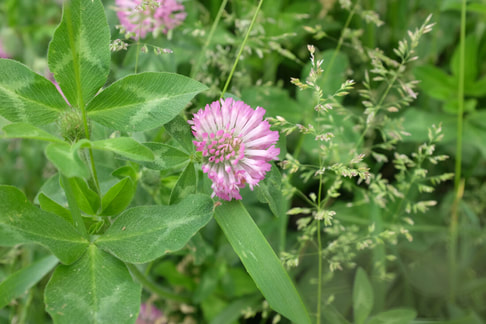 What is holistic medicine? The term holistic medicine can refer to a style of practice of conventional medicine. More often, it refers to alternative healthcare modalities including herbal medicine. Here are the some of the major differences from typical conventional medicine: Body, mind and spirit are addressed as an integrated whole The practice of conventional medicine is based on a mechanistic view of the body that was developed in the 1600's in Europe. Philosophers such as Descartes developed a worldview that separated mind and body (which was done, perhaps ironicaly, for religious reasons). The mechanistic view sees the body as a collection of individual material parts, and treatment aims at making changes in those individual parts. This paved the way for the great medical achievements we can all be grateful for. By contrast, the holistic view of the body sees the person as an integrated whole. In broad terms, we say that holistic medicine address body, mind and spirit. This doesn't mean rejecting the mechanistic view, but adding an additional lens through which to understand health. This means that when someone has a imbalance, a holistic approach would be to look at the broad, overall factors: - How does lifestyle play a part? - How do stress and emotional health contribute? - How are the parts working together as a whole, on a subtle, perhaps immaterial level? Find the root cause of imbalance While a good conventional medical doctor definitely will seek to identify causes of illness and address them, holistic medicine generally prioritizes this much more. Holistic modalities such as herbal medicine do also have the ability to address symptoms, just as conventional medicine does. But the power in holistic medicine is the ability to go beyond that and to seek resolution or at least longer-lasting relief by address the causes of imbalance. Often times people experience multiple symptoms that may have similar root causes. For example, someone may experience digestive issues, skin flare-ups and sleep issues - these can all be addressed symptomatically with conventional and holistic medicine. However they may all relate back to a common root cause, such as stress, digestive insufficiency, food intolerance, or a sedentary lifestyle. A holistic provider can help to identify the root cause and provide support in addressing it. Gentle remedies that support the body's own ability for self-healing Holistic medicine generally supports the use of gentle, non-invasive interventions. While gentle interventions are safer and less likely to cause adverse effects it doesn't meant that they are less effective. Holistic providers often believe that the body has its own capability for self-healing. By working with this capability rather than seeking to provide a substitute for it, profound changes can result. Take for example someone who is experiencing occasional heartburn. One approach would be to reduce acid in the stomach with medication. This is certainly a helpful thing to do in some cases because it can prevent the harm that chronic reflux can cause. But a more holistic approach would be support the body's ability to heal the muscosa and prevent the need for medication. Gentle remedies used in this process often take time to have their full effects, but the effects may be more lasting. Personalized care Holistic medicine is generally much more individual and personal that conventional medicine (though conventional medicine may be becoming more personalized). Personalized approaches can often lead to better results with less adverse effects. For example, in herbal medicine we often use the lens of individual constitution. There is a long history in medicine traditions around the world in recognizing different constitutional types: there are "fire-y" people, "air-y" people or "earthy" people, for example. Herbalists provide remedies that not only are specific for the symptoms someone is experiencing, but which also match their unique constitutional type. The personalized approach is one of the reasons why using gentler interventions can still provider profound results. With the art of personal assessment, holistic providers can help people to more naturally shift back into a state of balance based on their own patterns. Different types of holistic medicine modalities There are many different types of holistic medicine. Herbal medicine This is a part of all cultural traditions throughout the world. While still utilized by an estimated 80% of the world's population, just a few generations back it would have been close to 100%. Herbal medicine thrives as a modality that is natural, safe, and convenient in that it can be utilized right at home. Acupuncture Acpuncture is one part of Traditional Chinese Medicine. It involves the use of needles placed at various "meridian points" throughout the body. The theory behind acpuncture is that it allows the practitioner to manipulate subtle energy channels or "qi" in the body to promote healing. Naturopathy Naturopathic medicine has been practiced in the U.S. since around 1900. It is a modality that incorporates conventional medicine but which adds in holistic therapies such as herbs, homeopathy and manual therapy. Naturopathic doctors are licensed to practice medicine in several U.S. states, including Vermont, meaning that insurance can sometimes cover naturopathic care. Ayurveda Ayurveda is the traditional healing system of India. It's based largely on the understanding of how three different "doshas" operate in the body: vata, pitta and kapha. Ayurvedic practitioners may use a variety of methods to address health, including the use of herbs and minerals, massage, diet, detoxification therapies and more. This is just a short list of examples, there are many more! How to incorporate holistic medicine into your life As herbalists, we are in full support of conventional medical care, and suggest that everyone have a doctor who can provide them that care when needed. We see holistic medicine is something that you can incorporate into your life as a complement to your conventional care. Self-study in holistic medicine is an option for certain things, like handling minor, everday ailments, and for preventing illness. However where there are more difficult health challenges, we suggest working with a holistic medical provider to help guide you on your path to wellness. As herbalists, we are happy to help support you on your healing journey. Check out the information below to learn more. Get holistic support from an herbalist 🌿 Schedule a "quick advice" herbal consultation for a 20-minute chat We'll pair you with an herb or herbal blend that matches your personal constitution and individual mental/emotional needs. 🌿 Looking for deeper support with mental/emotional health? Schedule our 3-month herbal support package. We'll help you address the root causes of imbalance with herbal support plus diet + lifestyle support. 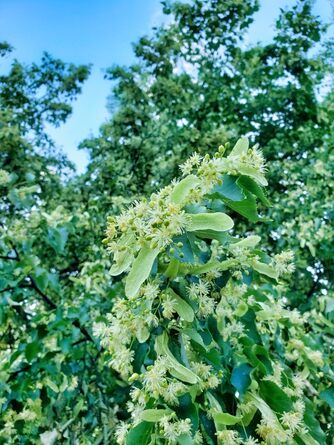 Many of us are facing some form of health challenge. It may be the effects of stress on sleep, digestion or mood. It may be a low-grade, chronic health condition. It may be a new issue that was unexpected. Enter plants. Herbs are effective You probably already know from your own experience that plants work. Maybe you have felt the energizing effects of echinacea when sick, the soothing effects of licorice on a sore throat, or the calming effects of a nice cup of chamomile tea. What not everyone is aware of is that plants can also help with the more challenging health issues that can come up. Our traditions shows us this When looking at the world as a whole, we can see that many people rely on herbs. Estimates are that around 80% of the world's population relies on herbal medicine for some part of their primary healthcare. In the U.S., there are people who grew up relying on herbs in their home. For those that didn't, it only takes looking a few generations back to see that the history was there. Our ancestors didn't know everything, and didn't have all the modern tools we have, but they were practical - they found what worked, and they passed the knowledge along. Research is showing it more and more Here are just a few recent meta-analyses (the gold-standard in research):  Herbs often work best with guidance There are generally two paths to utilizing herb for your personal health. One is self-study, or the support of family members or friends. The other is the support of a clinical herbalist or other skilled practitioner. For common, mild concerns such as immune support or relaxation, self-study is more than sufficient. It's easy to to read a book or talk to a friend about an herb to help soothe and relief common discomforts that we all experience from time to time. For the more chronic or serious concerns, this is where working with a clinical herbalist (or equivalent) is much more effective. Clinical herbalists are highly trained and understand the nuances of the individual experience of different health imbalances. Getting guidance is a safer way to go Herbs are generally safer and gentler than pharmaceutical medications, which is one of the main reasons to use herbs. However, there are some safety considerations to be aware of. Herb-drug interactions are rare but can post a significant risk for some people. Clinical herbalists are trained in herb safety and are able to help you navigate the risks in conjunction with your medical provider. Adverse effects from herbs are also rare but are possible. Just because it's natural doesn't inherently mean it's safe. The very young, very old, and people with serious medical conditions are most at risk for experiencing adverse effects. Clinical herbalists can help you create a plan that is safe for you as an individual. Getting guidance saves time and money Experimenting on your own can be costly. You may try many things that don't work. Working with an herbalist helps you get to an effective solution quicker. Clinical herbalists can also help you to find a solution that fits within your budget. There are many options for taking herbs, including tea, tincture, powder and capsule. Clinical herbalists can help you learn to incorporate less costly solutions into your daily life, and can even help you learn how to grow, harvest or prepare your own herbs and herbal remedies. Personalized solutions work better We've all heard about so many popular herbs: turmeric, echinacea, garlic, etc. The thing is, those popular herbs usually do work for many people - but they often don't work for a lot of other people. The reason for a diversity of effects has to do with what herbalists call individual constitution. We're all built in different ways, and we've all been shaped by different life experiences. The real magic of herbal medicine comes with matching the herb and the person. A clinical herbalist can do a traditional assessment to help you identify the specific herbs that best match the current pattern of your health. Additionally, clinical herbalists can blend individual herbs together to create a final product that meets your individual needs. This is often more effective than using any one popular herb on its own. The other options may not be enough Perhaps you've tried conventional medicine. Herbalists generally are not adverse to conventional medicine at all. The profound power of modern interventions is something we can all be grateful for. Yet many people have not fully found the answers that they are looking for with conventional medicine alone. Herbal medicine truly shines as a supportive form of care, either for conditions that are not overt enough for medical treatment (i.e. "sub-clinical"), or as a complementary support for medical treatment. Give an herbal consultation a try Clinical herbalists are highly trained. We learn basic anatomy, physiology, pathology and pharmacology. We learn about holistic, natural and simple ways to support health through diet and lifestyle. And we learn the plants better than probably anyone else -through deep study and time hands-on with the plants we get to know them through personal experience. If you're ready for a change, a natural solution, and to have someone there to support you on your health journey - consider giving an herbal consultation a try. At Railyard Apothecary the process is simple:
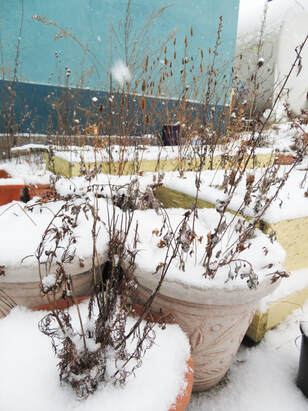 The meaning of winter Beyond our human customs, there is a natural way of this season. The winter solstice marked the ending of the waning of daylight, and the beginning of the the slow return of sunshine. At the same time, the depths of winter are just beginning, and the coldest, snowiest days of the year are surely ahead. It is only natural that in this time many people set intentions for the seasons ahead. Just like the animals in slumber dreaming of warmer days, or the seeds and roots, full of potential yet quiet beneath the soil, we imagine a future so different from now, which can exist only when the causes and conditions arise in their time. What future do you wish to see? What dreams do you dream? What can our shared world become? Now is the time to think big, to let your wildest dreams dance about in the vast expanse of imagination. For it is in this time of stillness, of quiet, without so much distraction that we can find the deepest connection to that which is yet to become. Some suggestions:
Whatever intention-setting you may be doing this year, we here at Railyard are here to support you in the areas of health, personal growth and education. To better your health, we offer herbal consultations. Working with an herbalist is usually the most effective way to improve your personal health with herbs. Our unique expertise and experience saves you time and money in finding remedies that work. People enjoy the support and guidance that they feel in working with an herbalist on their health journey. There are also other healing practices here, including a naturopathic doctor practice, acupuncture, ayurveda and more. You can see some of the practitioners' info here.
This year we are looking forward to growing our services and growing our community with all of you. Thank you for being a part of this journey with us! |
Details
RAILYARDCheck in here to keep updated on news and activities at the apothecary. Archives
April 2024
Categories
All
|
railyard apothecary
*These statements have not been evaluated by the Food and Drug Administration. This product is not intended to diagnose, treat, cure, or prevent any disease. For educational purposes only.
|
|
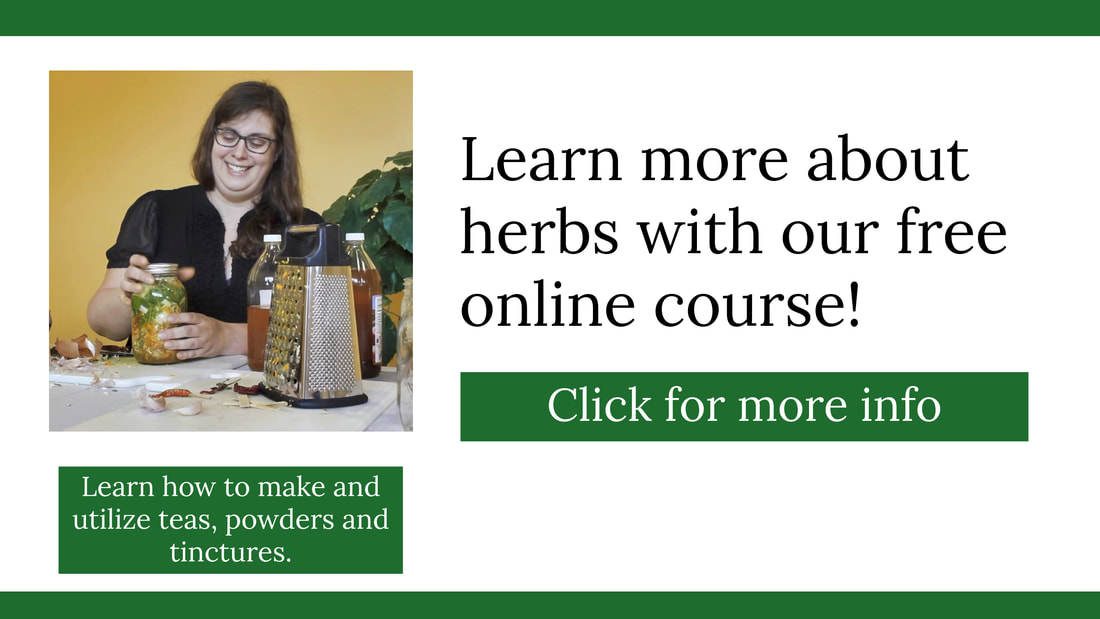
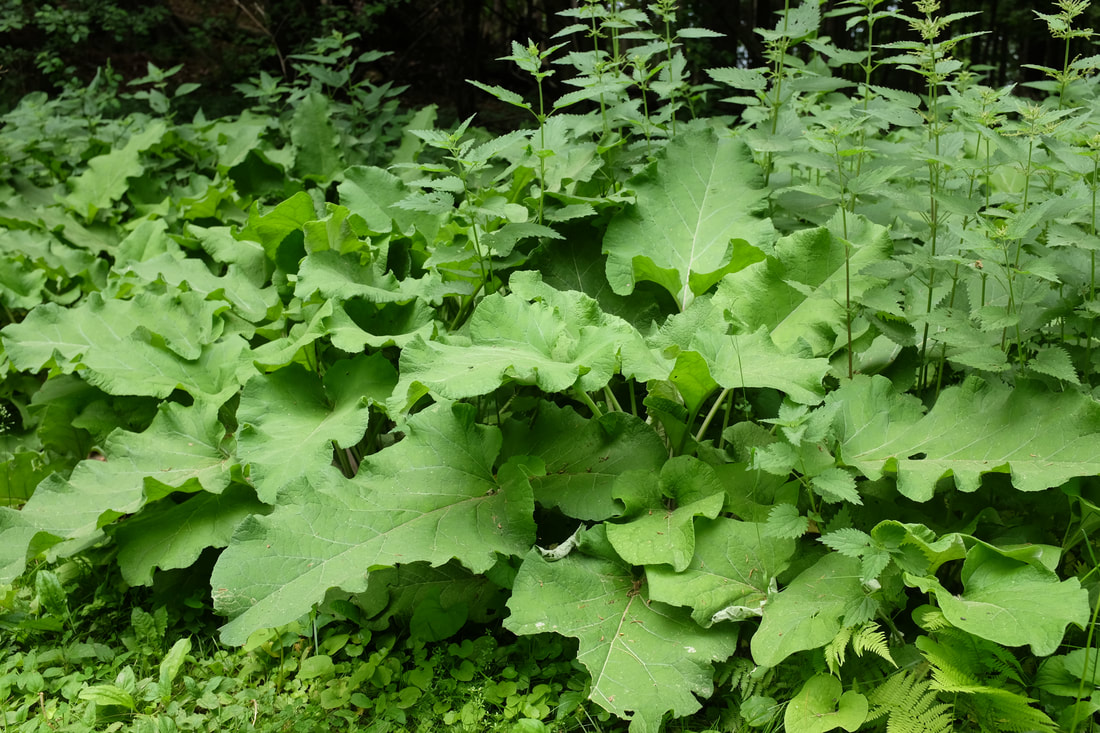

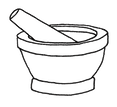
 RSS Feed
RSS Feed
